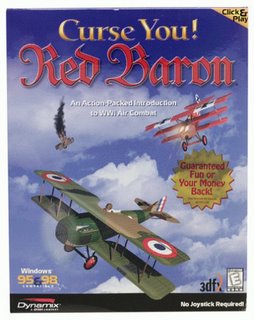TTAB Finds "RED BARON" For Gaming Devices, Computer Games Confusingly Similar
The Board shot down an Australian company's attempt to register the mark RED BARON for "gaming devices, namely, gaming machines and associated software," finding the mark likely to cause confusion with the identical mark registered for "computer game programs."In re Aristrocrat Technologies Australia PTY Limited, Serial No. 76460411 (November 3, 2005) [not citable].

The Board noted once again that, when the marks at issue are identical, a lesser degree of similarity between the parties' goods is required to support a likelihood of confusion finding: "there need be only a viable relationship between the respective goods."
Examining Attorney Sonya B. Stephens piloted the PTO's refusal, relying on several third-party registrations that include both gaming devices and computer games in their identifications of goods. Under In re Albert Trostel & Sons. Co., 29 USPQ2d 1783 (TTAB 1993) and In re Mucky Duck Mustard Co., 6 USPQ2d 1467 (TTAB 1988), those registration "are entitled to probative value" on the issue of relatedness of the goods.

In addition, the Board found certain regulations of the Nevada Gaming Commission to be of relevance. Applicant submitted those regulations to prove that "the gaming industry is highly regulated, and that the purchasers of gaming devices such as applicant's are casino owners and their representatives who necessarily are professional, sophisticated customers." The Board, however, noted that one of the regulations, relating to the "themes" that are allowable, provides that a gaming device may be based upon or derived from the theme of a computer game.
"That is, the regulation specifically contemplates that a gaming device and a computer game program could be based on the same theme. Thus, consumers who are aware of the practice that gaming devices can be based upon or derived from computer games are likely to believe that applicant's RED BARON gaming device is based upon or derived from registrant's RED BARON computer game, and that there is a connection in sponsorship or source of the gaming device and the computer game."
Applicant argued that its goods are sold at trade shows to "professionals who are careful, sophisticated purchasers," while registrant's goods "are marketed to young video game players who purchase the games, inter alia, at kiosks in shopping malls, and at specialty stores such as Circuit City and Best Buy." The Board, however, noted that the "class of purchasers" for applicant's gaming devices "also include the ultimate users of such gaming devices, i.e., the patrons of the casinos and other gaming establishments who encounter and use applicant's gaming devices."
"Given the fact (of which we take judicial notice) that slot machines and other gaming devices may be played a penny, nickel or quarter at a time, these ultimate users of gaming devices must be deemed to be ordinary consumers and impulse purchasers who do not exercise more than an ordinary degree of care in deciding to play video gaming devices in a casino. These casino patrons are also purchasers of registrant's computer games, either for their own use or the use of their children or others."
The Board therefore found confusion likely, and it affirmed the Section 2(d) refusal to register.
TTABlog note: The RED BARON decision was issued just one day after a different Board panel came to a similar conclusion, on less evidence, in In re Sierra Design Group, Serial No. 78172916 (November 2, 2005) [not citable], finding the mark AMERICAN HEROES for gaming equipment likely to cause confusion with the registered mark AMERICAN HEROES COLLECTION for "computer game software. "
So it wouldn't be much of a gamble to say that at least 1 out of 3 TTAB judges thinks that gaming devices and computer game software are related goods.
Text Copyright John L. Welch 2005.




0 Comments:
Post a Comment
<< Home